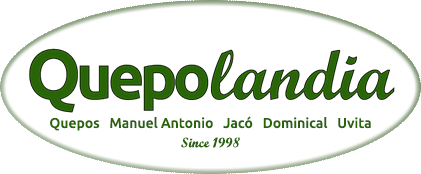KIds Saving the Rainforest – January 2020
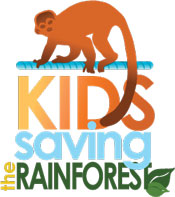
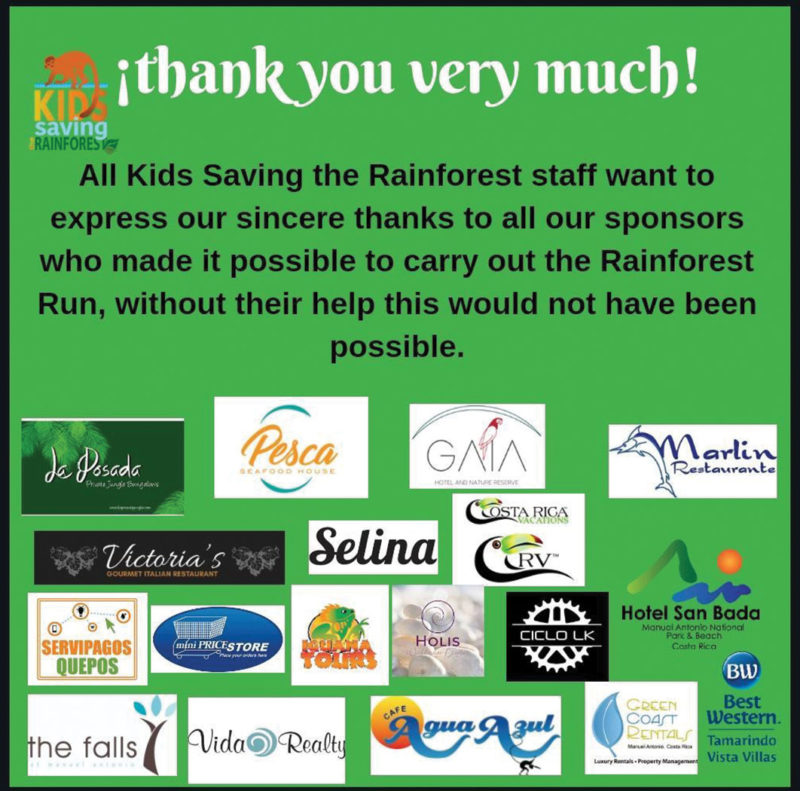 Hello from Kids Saving the Rainforest Animal Rescue and Sanctuary & Reforestation project. Is it really 2020 already? 2019 was a great year for KSTR as we planted 10,000 on our reforestation property and treated many kinds of birds, sloths, kinkajous, monkeys, anteaters, coatis, porcupines, and other wild animals at our onsite vet clinic. We also celebrated our 20th year anniversary in 2019.
Hello from Kids Saving the Rainforest Animal Rescue and Sanctuary & Reforestation project. Is it really 2020 already? 2019 was a great year for KSTR as we planted 10,000 on our reforestation property and treated many kinds of birds, sloths, kinkajous, monkeys, anteaters, coatis, porcupines, and other wild animals at our onsite vet clinic. We also celebrated our 20th year anniversary in 2019.
We want to bring the New Year in right by thanking all of our donors, sponsors, and supporters of 2019.
Thanks to you all, our first 5K Rainforest Run was a huge success! So many people asked us to do it again next year, that it is now a tradition!! So save the date for November 22, 2020!
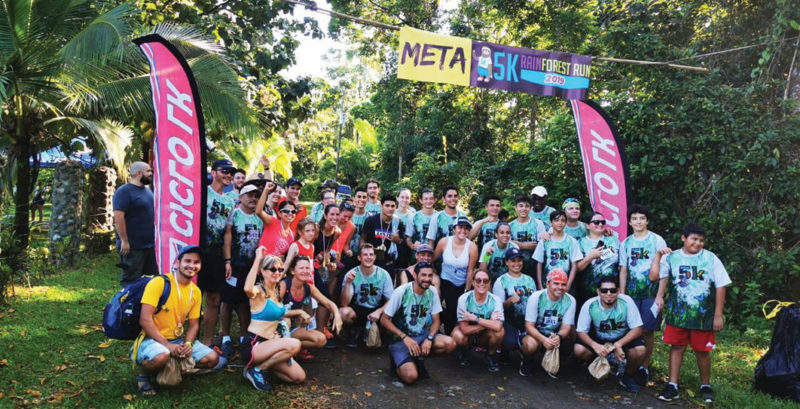
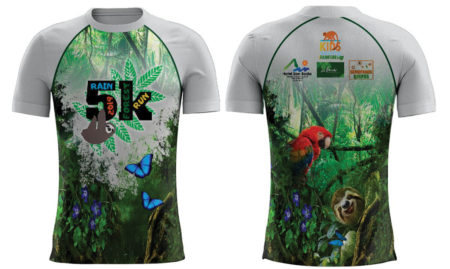
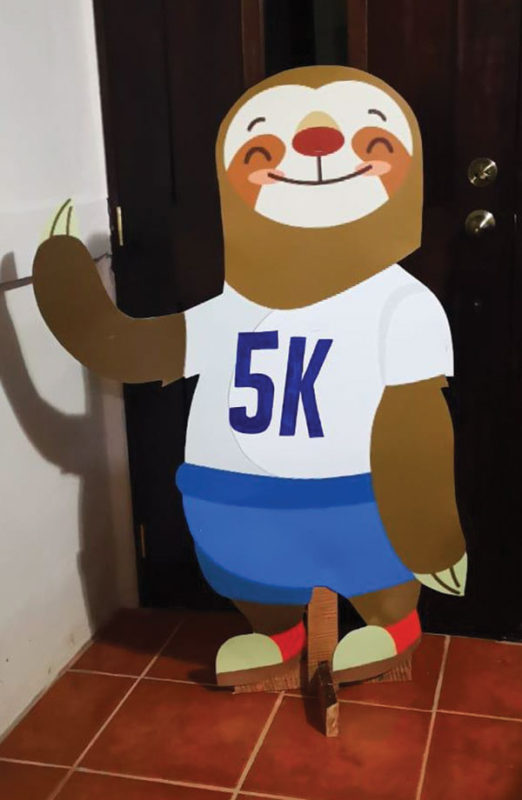 Everyone that ran the race had a tree planted in their name! (Ok, 2 year old Mariana didn’t run the race but she posed for the picture!)
Everyone that ran the race had a tree planted in their name! (Ok, 2 year old Mariana didn’t run the race but she posed for the picture!)
And last but not least, our Sloth Mascot! And yes, you can take a sloth selfie with him!
KSTR teamed up to help the Costa Rican government to promote “No Selfies With The Wildlife”. The only wildlife that can be in pictures with humans are Plush Wildlife. This is our KSTR Staff to promote “No Selfies With The Wildlife”.
Please remember to not take pictures with the wildlife, it is very stressful for them! They are voiceless so we are speaking for them!
Many of you know that we have been teaching people not to feed the wildlife for over 15 years. Please take the time to read and understand the important reasons not to feed or interact with the wildlife.
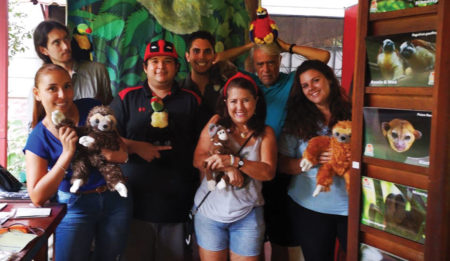 Please do not feed or interact with the wildlife…it is the law!
Please do not feed or interact with the wildlife…it is the law!
Did you know that Costa Rica has a great wealth of nature, with about 5% of the species worldwide concentrated in our small country? We have over 8,500 species of plants, 220 species of reptiles, 160 species of amphibians, 205 species of mammals, and 850 species birds. However, deforestation, poaching, the use of pesticides, illegal pet trade, and improper feeding have caused a decline in populations of many species to levels that threaten their survival.
You might find feeding and interacting with the wild animals to be a thrilling experience, but you are not doing the them a favor. In fact, you are actually harming them, and it is against the law (Conservation of Wildlife Act No. 7317 according to Decree No. 32633- MINAE). The only exception is a dire emergency where a species would perish without aid or food.
Here’s why you should not feed our wildlife:
- Wildlife are highly susceptible to diseases from human hands. They can die from bacteria transferred off your hand that has no ill effect on you. They can pass diseases to you as well.
- Migration to human-populated areas to be fed increases the risk of dog attacks, road accidents, and electrocution.
- Irregular feeding leads to an aggressive behavior toward humans and other species and creates a dangerous dependency on humans that diminishes the wildlife survival abilities.
- Contrary to the stereotype, bananas are not the preferred food of monkeys in the wild, nor other wildlife in the area. Tropical fruits, seeds, eggs, and insects found in the wild are what nature intended. Bananas, especially those containing pesticides, can upset their delicate digestive systems and cause serious dental problems that can lead to eventual death.
- Pregnant females who are fed nothing but bananas during their pregnancy will not give birth to healthy infants. The babies will be malnourished, or even die before birth.
- Feeding interferes with their natural habits and upsets the balance of their lifestyle.
- Contact with humans facilitates poaching and the trade in illegal wildlife.
- Wildlife needs to travel long distances each day to be in good physical condition. If they know that food is available in a particular location, they will not leave that area.
- In addition, pursuing or getting close to animals for pictures or touching is very stressful to the animal. Sloths may look like they are always smiling, but close human contact causes them to become agitated, so keep your distance!
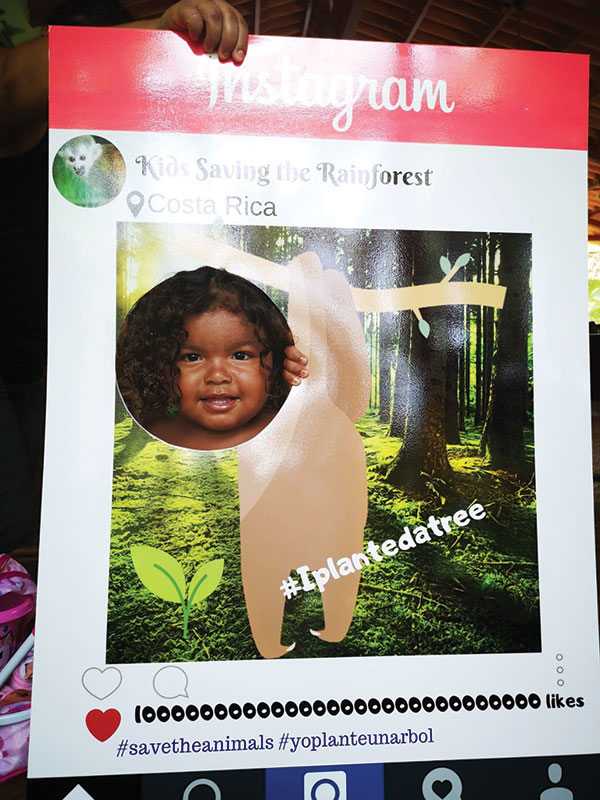 The wildlife does not realize any of this. Now YOU do, so you are no longer naive to the harm caused by feeding and interaction. Don’t facilitate the extinction of nature’s most amazing creatures for your own pleasure or financial gain.
The wildlife does not realize any of this. Now YOU do, so you are no longer naive to the harm caused by feeding and interaction. Don’t facilitate the extinction of nature’s most amazing creatures for your own pleasure or financial gain.
For questions or to report violations, please email Kids Saving the Rainforest, [email protected].
We have been disappointed to hear that people are still feeding them for personal and professional gain.
The Mangrove Tours are feeding the white-faced monkeys to get them to come onto the boats and even let the tourists feed them.
Hotels and Restaurants are feeding them to bring more tourists to their businesses.
We have said for a long time that we are going to publish the names of the locations that are feeding them. We never have because we want to live in harmony with the community. But this is too important to allow it to happen anymore. So please save the wildlife by reporting anyone feeding the wildlife to [email protected].
If you are feeding the wildlife, you now know you should stop. If you don’t stop, we owe it to the wildlife to publish your name with the local media and report you.
Wishing you all the best for the coming year, 2020!
Kids Saving the Rainforest is a non-profit animal rescue/sanctuary and reforestation project located in Quepos. Tours are available six days a week by contacting [email protected] and volunteer opportunities are available at [email protected]. Please check out our Facebook and Instagram pages as well. Pura Vida from the staff and interns at Kids Saving the Rainforest.
